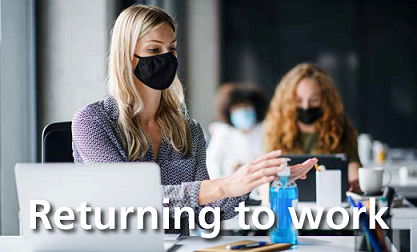Janet Calvert Health and Social Wellbeing Improvement Manager, PHA.

The Northern Ireland Executive currently advises that anyone who can safely work from home should continue to do so. Technology has enabled many office workers to work remotely from home. It is anticipated that in the coming weeks and months more people will be returning to their place of work.
The prospect of going back into an office environment may be a welcome change for those currently juggling homeworking with caring for children and other domestic responsibilities. Some workers who live alone may also feel that going back to the office is a welcome opportunity for social contact. Some, however, may be anxious about a return to office working. These feelings are normal and employers will be working to mitigate any concerns and ensure the office environment is as safe as possible.
Staying safe at work
UK Government has issued guidance on working safely during coronavirus (COVID-19). This provides practical actions for businesses and organisations based on 5 Steps to working safely as follows:
1. Carry out a COVID-19 risk assessment
A risk assessment should be carried out in line with Health and Safety Executive guidance and your workplace should be consulting with managers, workers and trade unions.
2. Develop cleaning, handwashing and hygiene procedures
Your workplace should be able to provide access to handwashing and surface cleaning. Supplies of hand sanitiser should be provided, with objects and surfaces frequently cleaned and disinfected, particularly surfaces that are touched often.
3. Help people to work from home
Your employer should take all reasonable steps to help you work from home by ensuring you have the right equipment for remote access to work systems, ongoing and effective communication and support to look after your health and wellbeing.
4. Maintain two metre social distancing, where possible.
In work you should be supported to maintain two metre between colleagues in the following ways; signs and floor tape visible to remind everyone of social distancing, avoiding sharing workstations and one way traffic in the workplace.
5. Where people cannot be two metres apart, manage transmission risk
If it is not possible for workers to socially distance, steps should be taken to reduce the risk of transmission. This includes keeping the activity time as short as possible, using screens or barriers, working back-to-back or side-to-side, staggering arrival and departure times and having ‘fixed teams or partnering’.
Speak to your line manager before your return to the office if you are concerned.
Self-care and managing your health and wellbeing
It is natural to feel a sense of unease or worry and it is important that we consider our mental health as well as our physical health. The restrictions during the COVID-19 response and recovery have been stressful for us all. The pandemic has however offered an opportunity to look at personal lifestyles and to make some positive changes to improve our physical and mental health. In order to be able to deal well with any concerns or anxiety associated with returning to the workplace, we need to look after ourselves.
This includes eating well, sleeping well, being active and keeping alcohol intake to within ‘low risk’ limits. It also means taking time out to relax and have fun, and trying to think positively.
The ‘Take 5 Steps to Wellbeing’ outlines basic steps we can all take to help maintain and improve wellbeing. These are Be Active, Learn, Connect, Give and Take Notice; further information on Take 5, along with a range of other helpful resources can be found here. The COVID-19 Wellbeing NI Hub contains a huge range of advice and self-help resources. You can access the hub on the Minding Your Head website – www.mindingyourhead.info
If you are concerned about your mental and emotional wellbeing it is important that you speak to someone. Speak to a friend or a family member or you can speak to your GP. If you are in distress or despair call Lifeline on 0808 808 8000 - calls are free from Northern Ireland landlines and mobiles.
